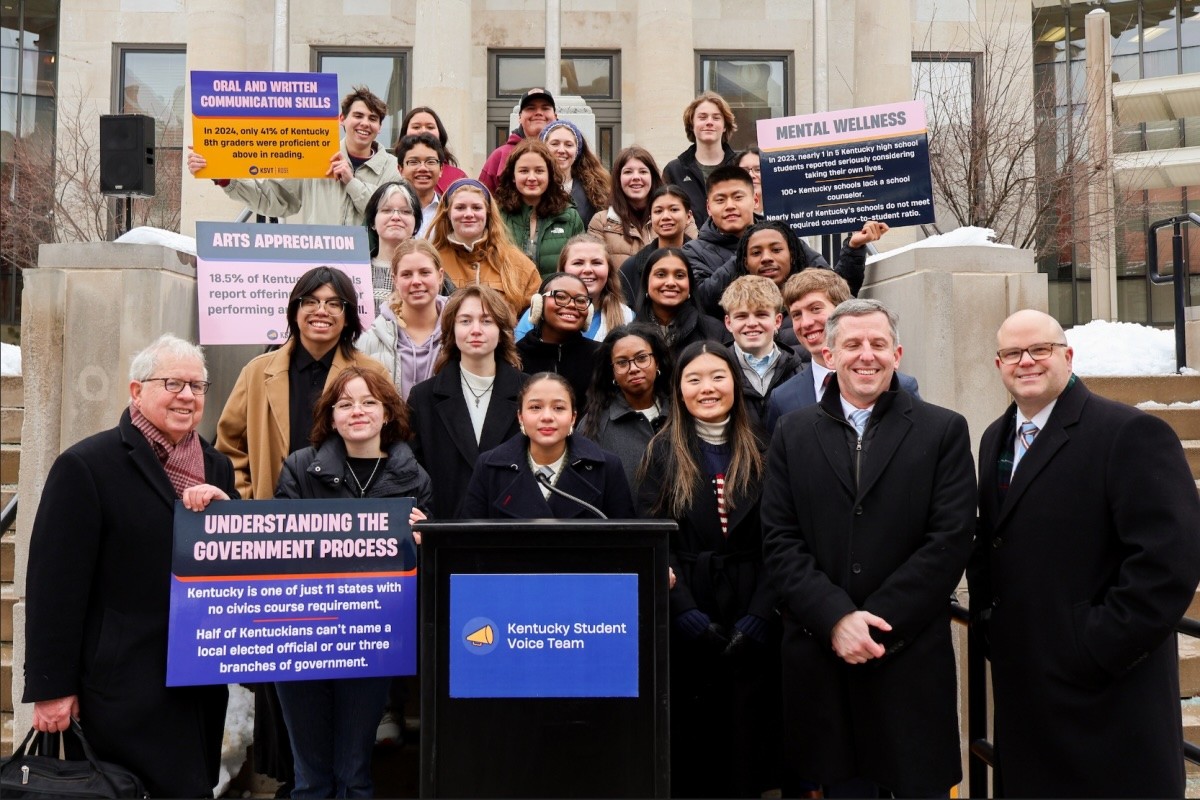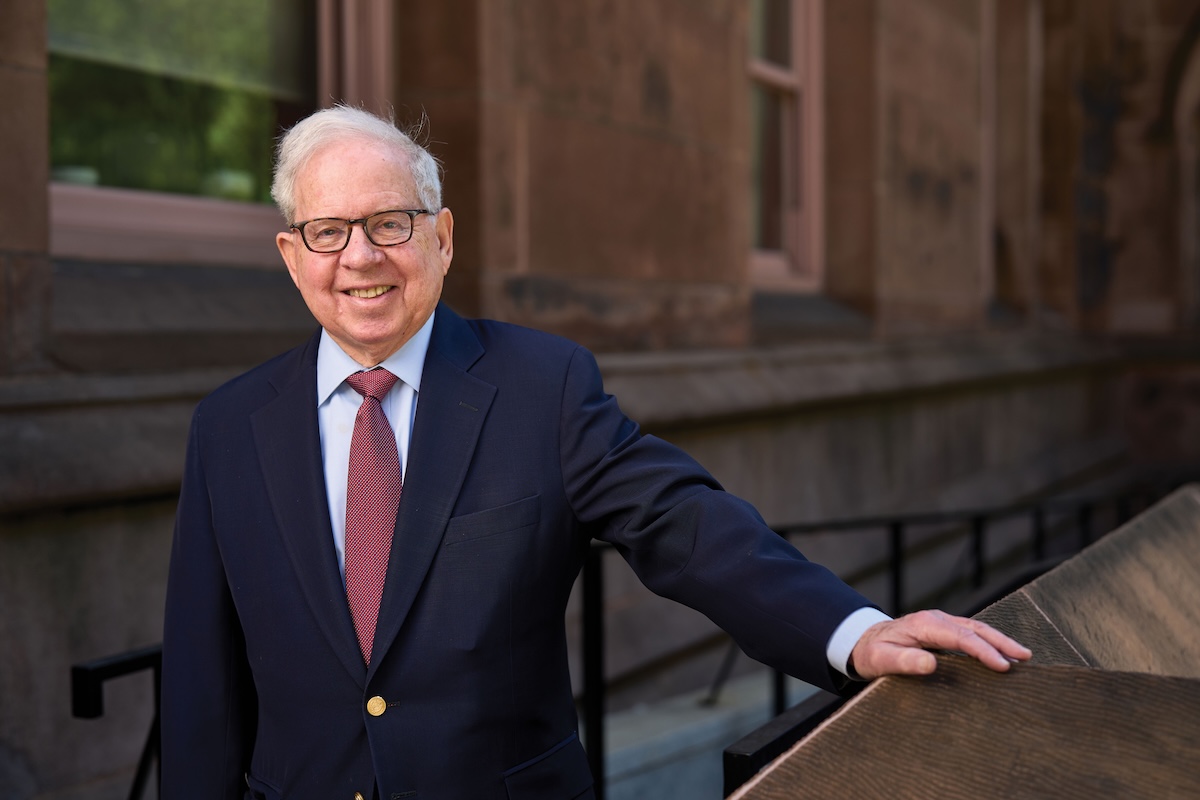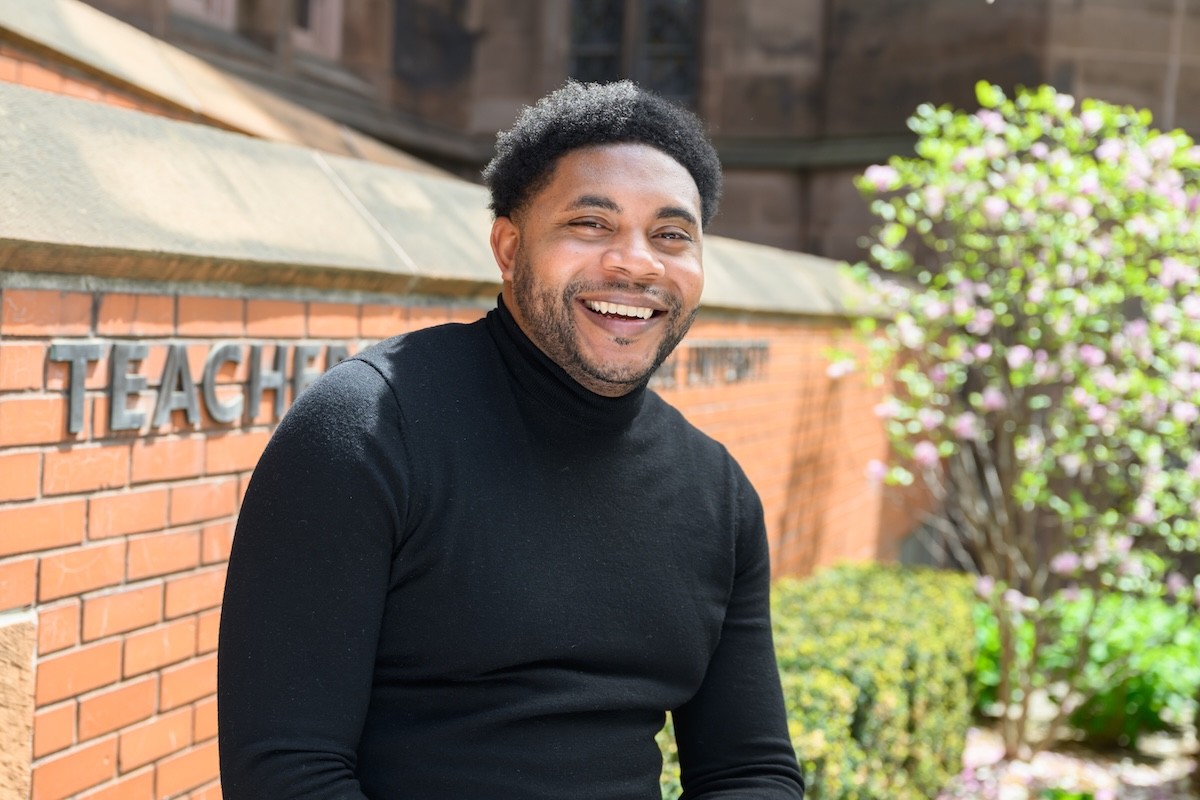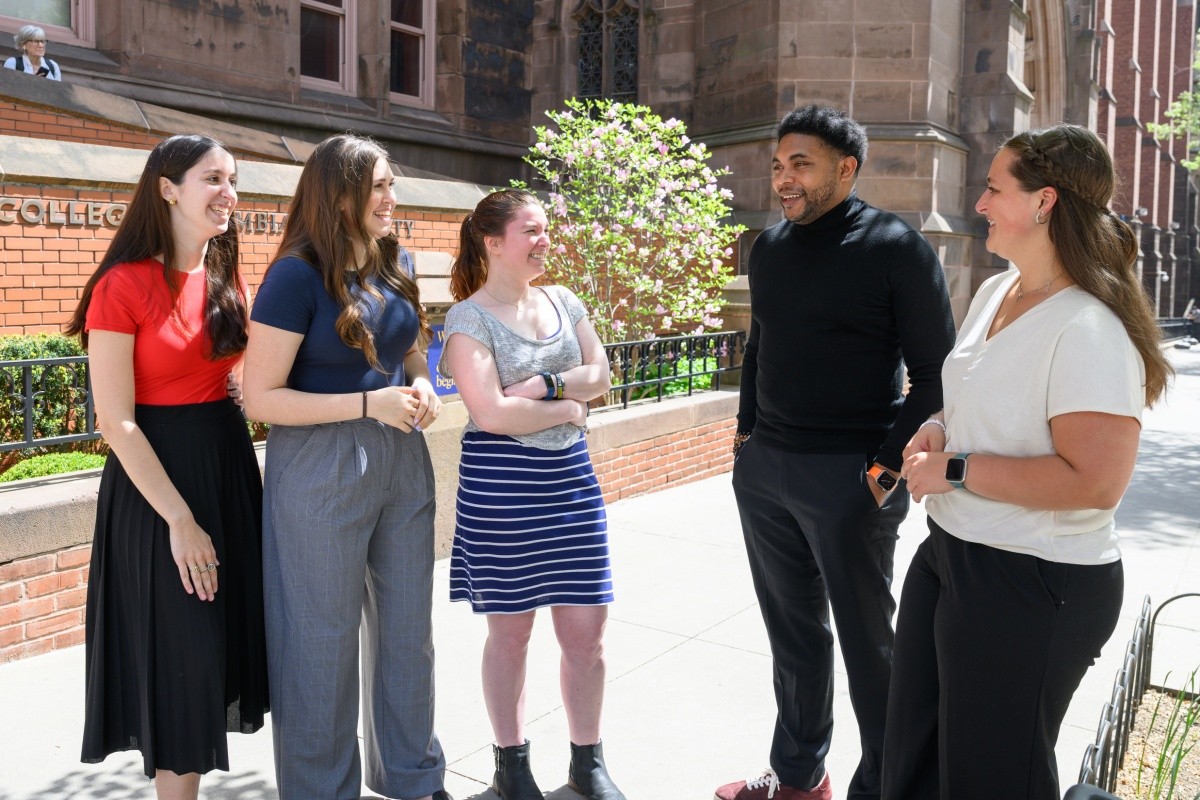Following major cuts to the U.S. Department of Education, many are wondering what’s next for America’s schools. But for TC’s Michael Rebell and Jonathan Collins, complex policy issues around how to improve educational equity, fix flawed systems, and help students in need have long been their focus.
Rebell stands at the helm of the College’s Center for Educational Equity, which he founded 20 years ago to leverage rights-based research, advocacy, and action to improve education for all students and better prepare students for civic participation.
The Center has tackled school funding rights in New York State, the right to civic education in New York and Rhode Island, inequities in Kentucky schools and other issues. It operates on the principle that an effective education is one that prepares students for democratic discourse and action.

(Pictured: Michael Rebell and the Kentucky Student Voice Team.)
Rebell — the Center’s Executive Director, an attorney, and Professor of Law & Educational Practice — has focused much of his professional efforts on litigation to support the education-adequacy movement. On Sept. 1, Rebell will step down from his role at the helm of CEE, and Collins — the Center’s current Associate Director — will take up the mantle. Collins, Associate Professor of Politics & Education, joined the College in 2024 and takes a more academic approach, applying his research to effect change in school board governance and expansion of democratic practice.
As the Center stands on the precipice of a new chapter, what continues to make its work so powerful is the unequivocal focus on how school systems can deliver a meaningful education to all students, even as Rebell, Collins, and Jessica Wolff, the Center’s experienced Policy Director, have expanded the definition of what that means. Critical to their work is including civic education and democratic practice.
“For many students, school is the first community they experience outside their immediate family, and school is where students learn the fundamentals about rights and responsibilities,” explains Rebell. “We’re proponents of having more frequent and substantive conversations around how our country works, and how we can get involved in our communities.”
Honoring the Scales of Justice
Policy experts, education law scholars and advocates may know Rebell from his first foray into the spotlight, when, as counsel for the plaintiffs representing the interests of New York City students, he challenged New York State’s funding formula for public schools with his seminal case in 1993, Campaign for Fiscal Equity (CFE) v. State of New York. The New York State Court of Appeals upheld CFE’s right to pursue a constitutional challenge to how the state funded public schools and, in 2003, ruled that state officials must “determine the ‘actual cost of providing a sound, basic education’ and establish a fair, need-based funding system.” After a series of higher court challenges that were upheld, the state legislature approved billions of dollars in additional state school aid.
Fair funding remains a key issue for Rebell, who is currently advocating for New York State to overhaul, not merely tweak, the formula for distributing education aid to local districts. He believes that homelessness, pandemic-related learning loss, and students’ mental health needs have particularly compounded the need for a funding reevaluation. Rebell asserts that New York’s current approach violates the 2003 Campaign for Fiscal Equity ruling; he and the Center teamed up with the American Institutes for Research to analyze state data and offer officials a comprehensive, up-to-date, new school funding system to replace the 18-year-old funding formula the state is still using.
Rebell recognizes that funding alone won't solve the problem of providing all New York students a "sound, basic education." The CFE case expanded the definition of “a sound, basic education to include education that prepares students to be active and effective participants in a democracy.”

Michael Rebell, Executive Director of the Center for Educational Equity, and Professor of Law & Educational Practice. (Photo: Rob Davidson)
“The definition [change] was really powerful. It emphasized the skills kids need to be productive as civic participants — capable of voting and serving on a jury,” explained Rebell, noting that “the court was really clear on the purpose of public education.”
Responding to that legal initiative, the New York State Board of Regents asked Rebell to head a statewide task force that developed a detailed definition of “civic readiness” that the Regents have adopted and created a civic seal program that has now been adopted by 620 schools throughout the state.
Through a state-based strategy that recognizes challenges at the federal level, Rebell is now litigating similar concerns on behalf of a Kentucky student coalition, who claim that the state's public schools have failed to prepare students adequately for civic engagement and have fostered achievement gaps.
In addition to mounting legal challenges, the Center has also partnered with the New York State Education Department to promote civic learning, media literacy training and youth engagement opportunities through DemocracyReady NY. It’s “one of our best accomplishments,” says Rebell, who is currently working on expanding the model to other states.
Reimagining School Boards
While Rebell takes on legal questions related to education policy, much of Jonathan Collins’ research drills into school boards, and what they can do to restore public trust and increase positive engagement — a specialty that’s taken on more relevance since 2020 and aligns with the Center’s emphasis on civic participation.
“COVID injected a level of partisan conflict into school governance that hadn’t been there before,” explains Collins, noting that pushback against vaccine and masking requirements, as well as DEI policies and transgender student rights, have made local school boards proxies for larger national issues.
The phenomenon — often referred to as the parents’ rights movement — exploded in 2021 when conservative political action committees (PACs) began pouring millions into local races. And while the movement has gained grassroots support, the infusion of PAC money into local politics has surfaced questions about what it means to meaningfully participate in democracy — especially when only 30 percent of Americans currently attend school board meetings.

Jonathan Collins, Associate Professor of Politics & Education, and Associate Director of the Center for Educational Equity. (Photo: Nina Wurtzel)
“If you open the scope of the meeting,” Collins wonders, “would more parents actively engage, and would we see true public participation? Our hunch is yes.”
Collins joined the Teachers College faculty in 2024, with interest in TC and the Center’s role in a “lineage of changing the national conversation.” Through his research and practice, he expressly wants to change how school board meetings work to make the relationship between policy discussions and actual policy more transparent and effective. For example, Collins sees a future in which AI could be harnessed to "help everyone synthesize the issues affecting schools that could be translated to board members and generate a feedback loop."
Last August, the associate professor launched TC's School Board and Youth Engagement (S-BYE) Lab to identify how local school boards actually function, as well as provide strategies and solutions for improvement. More meaningful participation (including student representatives in states like New York) on school boards would lead, Collins believes, to better educational outcomes for students.

Collins with doctoral students. (Photo: Nina Wurtzel)
In service of that mission at the S-BYE Lab, Collins has undertaken a large-scale data collection effort to track and assess school board activity, while examining strategies that could improve public engagement. Other efforts include the development of an improved participatory budget model, which would allow the public to weigh in on local government funding choices, and the development of tech tools to improve engagement between school officials and the public.
As for what’s next, both Rebell and Collins see state and local engagement as evermore critical for education in America — especially at this particular moment. Their continuing work across school boards, civic education, and fair funding carry a new level of relevance.
“There are growing questions about American democracy as a national practice, but if you look at cities and school districts, the democratic deficits — low voter turnout, poor representation, the lack of deliberation — run deeper and have for decades,” says Collins, of his work with the S-BYE Lab. “We'll be looking to work with any school, any district, any community interested in building a new democratic infrastructure brick-by-brick.”
